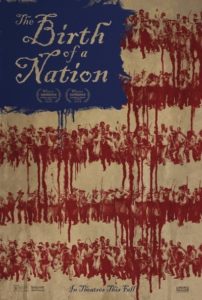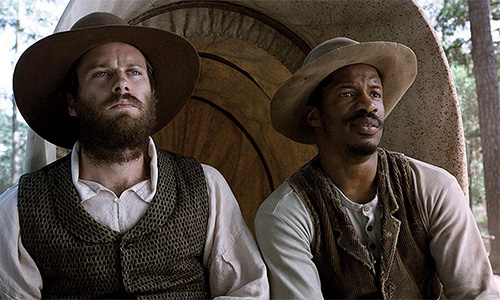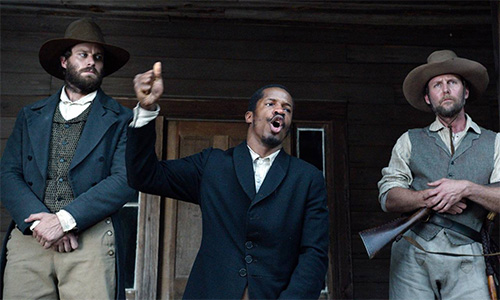 Nate Parker (Beyond the Lights, Non-Stop) made his big-screen debut in 2006, but a decade later, many moviegoers might need help picking him out of a lineup. However, that’s all about to change. The incredible The Birth of a Nation will launch Parker into the next tier of actors, directors, and screenwriters. I’ll be the first to say that I didn’t know who Parker was, but it might be time for me to go back and watch some of the movies on his filmography. Not only did Parker give an Oscar-worthy leading actor performance, but he also directed and wrote this film that, somehow, is flying under the radar. Parker knocked this movie out of the park. The 79% rating it receives on Rotten Tomatoes is quite respectable (especially for a film based on an actual event, but one that even Parker described as reality-based fiction). Still, I have yet to see any promotional materials for this movie. It opened the same weekend as Girl on the Train, which may have received as much publicity as any other movie released in 2016 so far.
Nate Parker (Beyond the Lights, Non-Stop) made his big-screen debut in 2006, but a decade later, many moviegoers might need help picking him out of a lineup. However, that’s all about to change. The incredible The Birth of a Nation will launch Parker into the next tier of actors, directors, and screenwriters. I’ll be the first to say that I didn’t know who Parker was, but it might be time for me to go back and watch some of the movies on his filmography. Not only did Parker give an Oscar-worthy leading actor performance, but he also directed and wrote this film that, somehow, is flying under the radar. Parker knocked this movie out of the park. The 79% rating it receives on Rotten Tomatoes is quite respectable (especially for a film based on an actual event, but one that even Parker described as reality-based fiction). Still, I have yet to see any promotional materials for this movie. It opened the same weekend as Girl on the Train, which may have received as much publicity as any other movie released in 2016 so far.
Part of me wonders if The Birth of a Nation is intentionally or unintentionally subdued because of what is happening in America. This movie is ultimately about enslaved African-Аmericans revolting against their white enslavers in 1831 in Southampton, Virginia. There was a high amount of racial tension in 2016 resulting from a multitude of things, including the numerous killings of unarmed African Americans by white police officers. It is both disgusting and frightening to see these events played out for the world to see via such things as handheld cameras. It has resulted in celebrities such as NFL quarterback Colin Kaepernick and US National Soccer Team halfback Megan Rapinoe taking a knee while playing the National Anthem. It has resulted in a person like Lebron James having to tell the American public that he worries about his son’s safety one day getting pulled over by a bad cop. It has resulted in some of my black friends saying that they are scared about getting pulled over by a police officer and are particularly worried about that happening to their children. Seeing some of my most upbeat friends uncharacteristically somber makes me sad. It has resulted in probably the highest racial tension since the 1991 Rodney King beatings and subsequent riots, if not since the Civil Rights movement of the 1960s. Sadly, I would say that this movie is very timely and probably should not be getting squashed the way that I feel it is getting squashed, at least how it has been leading into its debut weekend.
While watching this film, something that kept coming to my mind was how much it reminded me of 12 Years a Slave. While the movies were quite different from one another, they both revolved around slavery, particularly how cruel the white slaveowners could be to their African-American slaves. While I will compare the two movies in this review, I want to mention that 12 Years a Slave was put on a concise list of best picture candidates even before its release in 2012 (the movie did go on to win Best Picture, Best Supporting Actress, and Best Adapted Screenplay while also earning six other Oscar nominations). The Birth of a Nation doesn’t have nearly the fanfare, and while it might not be quite as perfect as 12 Years a Slave, it’s not that far behind. It’s an incredibly moving movie that tells a story many of us don’t know because this part of American History doesn’t receive all the attention it should receive in some of our high school social studies programs. I find it ironic that 12 Years a Slave received nine Academy Award nominations, while The Birth of a Nation might not earn any.

Regarding the storytelling, Parker engaged the audience early and often with his direction. When the adult version of his character finally appears on the screen, some 22 years after we meet a young Nat Turner, we already have a glimpse of who he is. The young Turner was born and raised on a plantation and knows no life outside it. His father was forced to abandon the family when he was found away from home late at night while securing food for the family. Knowing he is about to get killed by a band of white men who found him wandering, his father fights back and, in the process, kills one of the men. An eight-year-old Nat gets his first glimpse of how cruel the white men can be when he is questioned and then berated when the man comes to Turner’s living quarters demanding that he be told where the father went.
A young Nat is taught how to read The Bible by Elizabeth Turner (Penelope Ann Miller – The Artist, television’s CSI: NY), the white wife of the plantation owner and mother of his childhood friend Samuel. Soon, Nat preached the Bible to his fellow slaves. It is thought that the motivational readings and word of the lord would help encourage the other enslaved people to work harder and faster. It is believed that the slaves were lazy and not working to their potential, resulting in not as much cotton being picked and subsequently sold. Many plantation owners are in debt and, rather than purchasing and having to feed more slaves, are looking for ways to get their current slaves to perform better. Hearing one of their own preach the word of God is believed to be one way to achieve this.
Fast-forward to 1831, and only a little has changed except that Samuel (Armie Hammer – The Man From U.N.C.L.E., Nocturnal Animals) is now the plantation owner. Elizabeth is still around to help her son, but it is clear that the burdens, especially the financial ones, fall heavily on Samuel’s shoulders. Nat is still trustworthy, but the relationship is very much between the slave owner and the slave. They are not friends because it is unacceptable for them to be friends. Still, Samuel watches over Nat in a way that many other enslavers would not. So when he is approached by Reverend (Mark Boone Jr. – 30 Days of Night, F/X’s Sons of Anarchy) about using Nat as a way to make money by going from plantation to plantation to preach the word of God and inspire other slaves to work harder in the same way that he has inspired the ones at his plantation, Samuel reluctantly agrees. He doesn’t want to but needs the money to save the ranch. It’s what he has to do, and Nat understands.

Over a few months, Samuel and Nat traveled from plantation to plantation and met various people. Some slave owners are as seemingly kind as Samuel does, while others treat their slaves worse than they would a bag of trash. Some of the atrocities that we see occur rival that of 12 Years a Slave, if not surpass them. This portion of the movie is difficult to stomach at times. Like Samuel, the slaves are seen as nothing more than property, and even the “good ones” are seen as nothing more than property. I won’t give away any particulars, but Nat sees so many things that no person should ever have to see. Slowly, there is a rage building in him, and the voice in his sermons is changing from God being a loving one to quoting verses like Those who classify others as inhuman have relinquished the right to be thought of as human themselves. This is where the movie takes an entirely different turn, which I was not expecting outside of seeing the violent image on the poster.
I don’t have a problem with the turn in the movie. The movie’s whole point was to show the first slave revolt in the United States. The timing just felt odd. This turn in the film didn’t occur at the halfway point. It happened when the movie was two-thirds complete. Nat’s personality changed completely. I understand that seeing so many bad things in the world will change even the kindest person with the kindest soul. And that’s what happened with Nat. He flipped a switch quickly, and the change in his personality was more radical than anything you would expect, especially that quickly. The ending was a little unexpected, too, and it felt rushed. There were some not-so-subtle comparisons to the crucifixion of Jesus.
The Birth of a Nation is a fantastic movie. It’s flawed, but that should not hold it back. On the contrary, it’s an essential part of our country’s history. I honestly wish I had known more about Nat Turner going into this film, but I will be sure to do some research on him now.
Plot 8.5/10 (I wish it were a true story rather than being based on a true story and having its director even calling it reality-based fiction)
Character Development 9/10 (the development of Nat was incredible; there were just a lot of characters in this movie that it was a little challenging to separate a few minor ones from the others)
Character Chemistry 8.5/10 (the dynamic between Nat and Sam was great; there was less of a dynamic between Nat and other characters, such as Cherry)
Acting 8.5/10 (a coming-out party for Nate Parker as well as some lesser-known actors holding their own)
Screenplay 9/10 (each scene mattered, but the transition between acts 2 and 3 was a little rough; it was almost as if we had two different movies, which is fine if the transition makes sense. In the case of this movie, I felt that while you could feel the angst in Nat brewing from extremely early in the film, his switch from a passive approach to an aggressive one happened a little quickly)
Directing 9.5/10 (previously, Parker had only directed short; for his first feature-length debut, he did a fantastic job)
Cinematography 9.5/10
Sound 10/10 (tremendous score)
Hook and Reel 10/10 (engaged from the very first minute until the very last)
Universal Relevance 10/10
92.5%
Movies You Might Like If You Liked This Movie